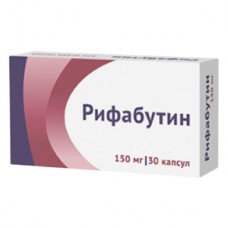Expiration date: 12/2026
Form release: Capsules
Composition
1 capsule contains rifabutin 150 mg
Packaging
30 PCs.
Pharmacological action
Semi-synthetic antibiotic of rifamycin group. Rifabutin has a wide range of effects. The mechanism of action is probably associated with inhibition of amino acid synthesis by inhibiting DNA-dependent RNA polymerase.
Indications
Prevention of infections caused by Mycobacterium avium complex (MAC) infection, in individuals with reduced immunity. Treatment of secondary joined mycobacterial infections (including MAC) infection. Tuberculosis (as part of combination therapy).
Contraindications
Hypersensitivity to rifabutin and other rifamicin.
Application during pregnancy and breast-feeding
Adequate and well-controlled clinical studies of the safety of Rifabutin in pregnancy and lactation (breastfeeding) was not carried out, so do not use Rifabutin in this category of patients.
Method of application and doses
Rifabutin is prescribed orally 1 time / day, regardless of the meal.
In non-tuberculous mycobacterial infections administered in a daily dose of 450-600 mg Duration of treatment - 6 months.
In chronic multidrug resistant pulmonary tuberculosis appoint 300-450 mg/day. Duration of treatment is 9 months.
In newly diagnosed pulmonary tuberculosis administered at a dose of 150 mg / day for 6 months.
For the prevention of MAC infection in patients with immunosuppression is prescribed in a daily dose of 300 mg.
Side effect
From the digestive system: nausea, vomiting, increased liver enzymes, jaundice.
From the hematopoietic system: leukopenia, thrombocytopenia, anemia.
From the side of musculoskeletal system: arthralgia, myalgia.
On the part of the organ of vision: reversible uveitis.
Allergic reactions: fever, rash, rarely-eosinophilia, bronchospasm, anaphylactic shock.
Special instruction
Caution must be exercised in the appointment of Rifabutin in patients with severe liver dysfunction.
In patients with mild impairment of liver and/or kidney does not require correction of dosing regimen.
When appointing Rifabutin in combination with clarithromycin daily dose Rifabutin should be reduced to 300 mg (due to the risk of uveitis). Caution should also be exercised in appointing Rifabutin in combination with other macrolides and/or flukonazole (and similar compounds). In the case of uveitis, an ophthalmologist's consultation and, if necessary, a temporary withdrawal of Rifabutin are shown.
Against the background of therapy with Rifabutin, red-orange staining of urine, skin and secreted liquids is possible.
Patients taking Rifabutin should not wear contact lenses.
Control of laboratory parameters
During treatment, it is recommended to periodically monitor the number of leukocytes, platelets in the peripheral blood and the activity of liver enzymes.
Drug interaction
Rifabutin induces cytochrome P450 3A enzymes and thereby affects the pharmacokinetics of drugs metabolized by these enzymes. With simultaneous administration with Rifabutin, it is necessary to increase the dose of these drugs. For the same reason, oral contraceptives may not be effective in the treatment of Rifabutin and the patient should use other contraceptives.
While the use of Rifabutin with isoniazid, pyrazinamide, protionamide, and especially significantly increases their antimicrobial activity.
While the use of Rifabutin fluconazole can increase the level of rifabutin in plasma.
With the simultaneous use of Rifabutin with clarithromycin, there may be an increase in the level of rifabutin in blood plasma.
Drug interactions with Rifabutin theophylline, sulphonamides, pyrazinamide, fluconazole and zalzitabinom unlikely.
Studies have shown that Rifabutin does not affect the pharmacokinetics of didanosine and isoniazide.
Overdose
Treatment: gastric lavage. Symptomatic therapy is shown, the appointment of diuretics is possible.
Storage conditions
The drug should be stored at a temperature not exceeding 25°C.
Shelf life
2 years.


